In whiche our Heroe discovers the lande of Washington and of the diwerse Adventures he encounters there.Day 0In high spirits. Bags all packed. Ready to go. More enthusiasm than even John Denver songs can kill. Congratulate myself on actually looking forward to a trip for once. Check flight status. Discover that my flight is delayed. Aaarghh! Discover that this means I will miss the last flight out to Seattle from Chicago. Double Aarrghh! Try explaining to woman on Southwest helpline that I can't possibly connect to a 6:40 flight from Chicago if my flight to Chicago leaves Philly at 8:10. She disagrees, informs me that flights can sometimes make up time in the air! I briefly consider discussing relativity with her, then hang up and head to the airport. Manage to get myself scheduled on the next morning flight to Seattle. Get back home exactly two hours after I left it. Talk about short weekend trips. Realise I have absolutely nothing to do but wait for 4:00 am next morning when I can leave for the airport. Again. Read Amis. Check and re-check that I've packed everything. Mope. Sulk. Mope some more. Sulk some more. Sigh.
Day 1A miracle! My flight actually leaves on time. Two hours of dozing and reading Chekhov, the words to
Daysleeper running through my head. From the plane, Chicago is a city of ghosts - a mysterious island of tall spires rising out of the morning mist. I stare across the breaking dawn at the Hancock building and dream of Minas Morgul, of the towers of Camelot. I feel as if the day were a huge door that I stood at the bottom of, timidly knocking. "'Tell them I came, and no one answered. That I kept my word', he said."
Half an hour later I'm eating a bagel sandwich in an airport cafe and wondering what this yellow stuff pouring in through the windows might be. Could this be the sunlight I've heard so much about? I used to know, but it's been a while. The girl on the table across from me is reading Franny and Zooey. I'm in love. We're both taking the same flight, only she's boarding with the A group and I'm in B. This means that she ends up sitting right at the front of the plane, while I end up squeezed into a window seat at the rear next to a 300 pound stranger who proceeds to spill his ice water all over my pants. If I end up staying single the rest of my life it's all the fault of the Southwest check-in algorithm.
Finally in Seattle. I can't believe it. I'm actually stepping out of the airport at exactly the time I was supposed to - no delays, no long, extra waits. I feel strangely triumphant. I lean against the airport exit and wait for M to come and pick me up so we can get going.
One hour later I'm still waiting. Clearly M has decided to take pity on Harry Wainwright and spare his life one more time. (M, incidentally, has a truly unique sense of direction. You know how most people, when they're in a strange city, will drive around asking for directions, and still end up getting hopelessly lost? Not so M. She can get lost in a city without any help at all. Just put her behind the wheel and before you know it she'll have managed to get you exactly where you didn't want to be. It's a gift.)
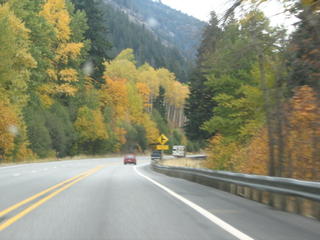
Once M finally shows up, we decide to head for a scenic drive through the area east of Seattle. This is picturesque country, where the autumn renders every landscape in loving detail, her pallette blending the dark emerald of the evergreens with the shimmering yellows and oranges of the fall, with a hint of blazing red thrown in for good measure. (I am reminded of Shelley - "yellow and black and pale and hectic red"). Tiny cabins dot the countryside, small hamlets appear in the distance as though they had been placed there simply to provide perspective, every now and then a little stream runs alongside the road, its cold, clear water, chuckling merrily over rocks worn smooth with age. There are no Starbucks here, no malls, but all along the road we see tiny little kiosks with signs offering the dark, bitter promise of freshly brewed espresso or little fruit stands built out of wooden crates, brimming with red and golden apples and tart, juicy pears. As the road meanders its way through the country, offering fresh vistas around each bend, we have the sense of returning to an older and less urgent time, of being drawn into a simpler, more rustic idyll. When we stop at a roadside stand to buy fruit, there's a warmth in the air that has nothing to do with the temperature - it's the sense of things ripening to fullness, to peace. A huge shaggy dog runs up to greet us as we get out of the car, strangers wave hello, ask us where we're headed. We take our time sampling the different varieties on offer, finally come away clutching two big paper sacks of fresh, juicy fruit.
It's this sense of calm, perhaps, that makes us take the turn-off to Deception Falls. Here, a hidden little path winds away into the forest, taking us deep into the heart of the
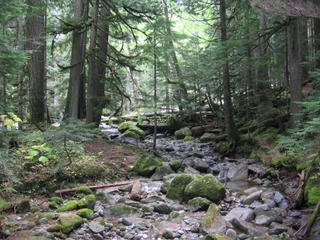
Skykomish woodlands. We skirt along the edge of a small river, following it down to where it suddenly cascades down a sheer rockface. The fall itself is not so impressive - what is beautiful here is the sense of having finally escaped into a blessed solitude. The ground beneath our feet is thick with fallen leaves and pine needles, the breath of the forest wafts sweetly over us. The only sound we here is the roar of the falling water, or (where the water quietens down again) the solemn hush of the 600 year old forest. This is the world of our ancestors, and walking in it, seeing the dying autumn sunlight making its way through its branches, you begin to realise why our forefathers worshipped trees. I think of Arden, of Eden. Tennyson writes:
"Sighing for Lebanon,Dark cedar, tho’ thy limbs have here increased,Upon a pastoral slope as fair,And looking to the South, and fedWith honey’d rain and delicate air......With such delight as theirs of old, thy greatForefathers of the thornless garden, thereShadowing the snow-limb’d Eve"It is this sense of wonder that I experience, this sense of authentic and natural magic.
Back on the road again, we reach Leavenworth, a small town made up to look like an old German village. The effect here is quaint but also a little grotesque. Some of the inns look authentic and beautiful, but there is also the anomaly of a McDonalds, its signboard written in Gothic letters. We turn back towards Seattle here - the sky has grown darker and we figure we may as well see something of the city.
On the way back, the mountains tower over us, their obsidian faces surprisingly stern in the twilight. The mountains are different here - craggier, more desolate - as though some giant hand had reached down to the earth and broken off great crags of rock. To our left Lake Keechelus stretches itself out along the highway, its waters yawning and lazy. A thin spiral of woodsmoke rises from a distant campfire, hangs over the lake like some protective spirit. It's as though the landscape, having won us over with its warmth and colour, now wished to show us its more desolate, more haunted side.
An hour and a half of driving (and a few wrong turns) later we arrive at our hotel in Seattle. We check in and decide to head out to see the city. I ask M if she thinks it'll rain and she confidently says it won't. I wear my raincoat anyway, but neither of us bothers to take our umbrellas. On the way down, M tells me about the new rainjacket she's bought - it's really trendy and compact and folds up into an easy to carry pouch. She promises to show it to me when we get back.
Just as we reach First Avenue (where we intend to hunt for a nice place to eat - M mutters something about wanting Mediterranean food), the rain begins to pour down in torrents. Half drenched in under a minute, we run into the first restaurant we see. This turns out to be a tacky little Sushi bar, more or less deserted. We're apprehensive, but decide to make the best of it. M orders sashimi and soup, I order sake. When the soup arrives we make the mistake of asking the waiter for spoons to eat it with. He looks at us as if we'd just offered to include his mother in an S&M orgy. Apparently true Sushi Eaters do not need extras like spoons to eat their soup with. Presumably they either eat it with chopsticks or lap it out of the bowl like a cat. You can see that he's about to offer us his samurai sword so we can commit ritual suppuku before we lose more face by making another such sacrilegous request. Finally he decides to take pity on M's bedraggled state and condescends to bring us two soup spoons (which it takes him five minutes to find). We can still hear him sighing in disgust as he heads back to the kitchen for the main course.
The result of this is that I don't have the courage to ask him for a fork when the main course arrives. This means that I spend the entire meal trying valiantly to eat with chopsticks. Bad memories of trying to use dividers in school return. M watches in amusement as I poke, prod, balance and ultimately destroy my food, managing to get it everywhere except in my mouth. The sushi's fairly ordinary but with generous doses of wasabi (which is the only reason I eat sushi anyway) it goes down well enough. By the end of the meal I'm still hungry but I'm too exhausted to try another bout with the chopsticks. We pay the bill and leave.
It's only when we're outside that we remember the reason why we'd gone in there in the first place. It's still raining. We think about going back in, then decide to walk down the road looking for a cab. We decide to 'share' the raincoat. This means that for the next ten minutes residents of Seattle are treated to the strange apparition of a giggling four-legged monster with black, flapping wings, a dark lump of a head and complete lack of any sense of direction. Four blocks, 12492 raindrops and no taxi later, we see a sports bar and decide (spontaneously) that we want to get a drink. Soon we're seated at a corner table, a slow pool of water spreading out around us, watching the Untouchables on HBO minus the volume because that's the only non-sports channel we can find on our table-top TV. Abandoning any attempt to be urbane and cultivated, we eat buffalo wings, drink beer, and wait for the shuttle from the hotel to come pick us up. So much for Seattle nightlife.
When we get back to the hotel, M proudly shows me her new raincoat. I consider strangling her, then realise that I need her to drive me around.
Day 2The next day arrives and we're out before sunrise, headed for Olympic National Park. A few U-turns more than strictly necessary and we're driving onto the ferry that will take us across the Puget Sound to Bainbridge Island. We end up parked right at the front of the ferry, so that just sitting in the car you can see across the sound to where the islands rise out of the fog. We get out of the car and go stand at the edge of the ferry looking out. The sun hasn't really risen yet, and there's a biting wind coming at us over the sea. It's chillingly cold. As the ferry starts, I can feel the thrum of its engines under my feet, feel the slow leviathan motion of its screws spinning us out over the water. The ferry moves with the slow deliberation of a juggernaut, of some massive giant lumbering surely towards its distant prey. Seagulls weave in the air above us. One hangs suspended for a minute over the ferry's prow, an ethereal figurehead, its spread wings trembling like scales in which the wind balances. Standing here, at the head of this great boat, with the seagull like the flag of some snowy country above me, I feel like Magellan or Ahab, tasting the first salt of the wind on my lips. As we move forward, the mountains ahead reveal themselves, drawing aside their veils of mist. A speedboat runs the blade of its wake across the water, chopping it in two. I feel the bracing chill of the wind invade my bones and feel exalted, purified. There is a sense of defiance in standing here, the feeling of matching oneself against the elements, of daring the sea and the wind to do their worst. Tunes from Wagner fill my head.
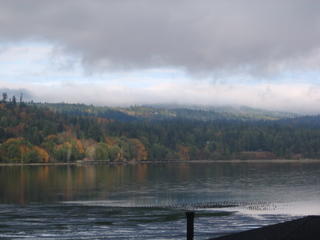
As we draw closer to the opposite shore, the forest in these parts is revealed in all its dark glory. The colours are deeper here, more sombre - dark lush maroons, and washes of woolen green. The overall effect is of something dense and woven, like staring at a thick carpet. As we drive across Bainbridge island and out to the coastal town of Port Angeles, the landscape makes me think of Lowell (remember Quaker Graveyard in Nantucket) even though the sea that Lowell wrote of is thousands of miles away, all the way across this great continent. There is that same sense of scale though, of deep and sweeping grandeur.
Four hours later and fortified with information from the ranger station at Port Angeles (and breakfast from a nice little cafe) we're driving along Crescent Lake. The sun is out for the first time this morning, and the water shimmers aquamarine. Stray clouds drift over the thickly wooded hills. The scene has the polished look of picture postcards.

We stop by the lake and take a two mile trail to Marymere falls. This is Tolkien country - tall trees rising all around us with a thin, leaf strewn path leading through. Great trees spread their branches over us, their leaves a golden orange. I think of Lothlorien and of Tinuviel dancing in the elvish forests. As we walk along, a hint of movement draws our attention. There, not ten feet away from us is a tiny fawn, munching contentendly away at the undergrowth. We stand still for five minutes staring at him - he looks up every now and then to stare at us, then goes back to his breakfast. Reluctantly, we move on, crossing wooden bridges one log wide, climbing a steep and slippery path to the viewpoint from where we can look down on the falls. Once again, the fall is beautiful, though not mind-blowing - the real point of this walk is surely the glorious forest that it leads through.
Our next stop is Salmon Rapids, where we are treated to the spectacle of salmon thrashing their desperate way up a cascade to spawn. I am reminded of Lowell again ("O to break loose, like the chinook / salmon jumping and fall back / nosing up to the impossible / stone and bone crushing waterfall - // raw-jawed, weak-fleshed there, stopped by ten / steps of the roaring ladder, and then / to clear the top on the last try, / alive enough to spawn and die."), watching this terrible fight for existence, the great-heartedness of the fish as it makes its flapping, desperate way against all conceivable odds.
Then it's on to Rialto beach, where I finally, finally, get my first real look at the Pacific. This is a proud, almost religious moment. I feel "like stout Cortez, with his eagle eyes / he stared at the Pacific". All around me twisted shapes of rocks rise out of the water, lending character and perspective to the infinity of the ocean. As we walk along the beach, headed for the far away headland, I realise that there are two infinities here - the sprawling infinity of the ocean, in which all other distances vanish and dissolve, and the miniscule infinity of the rocks on the shingle beach, their surfaces polished to perfect smoothness, their colours as rich and varied as the waves that have brought them here. I see pastel stones and speckled stones, stones of brilliant green and blood red and final, irrevocable black. It is strange to think that even as we walk, our feet sinking into the shingle at every step, we tread on so various, so endless a treasure.
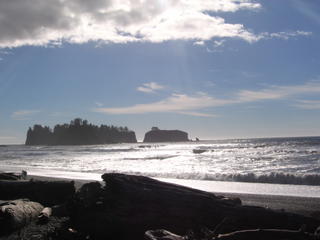
Before long, we find our path blocked however. A swift stream of water cuts across the beach, making it impossible to go further. We are disappointed. We cast around for ways across the creek (eyeing dubiously a couple of fallen logs) then finally decide it's not worth it and head back to the car.
A quick trip to the Hoh rain forest later, we're back on the shore - this time at Ruby Beach - just in time to catch the sunset. As the sun goes down, the sky is bathed in gold, with great swathes of purple cloud drifting across. The rock formations around us seem ossified and timeless, set in an endless twilight of stone, trapped in the shapes of their sorrow. I think of Lot's wife. As the sun vanishes and the sea gleams in waves of gold, these rocks are the only thing that can resist reaching out to the sunset, going forward to the very edge of the tide to try and touch the glory of the sky at dusk.
Here at last is the moment made timeless, and I begin to finally understand the vision, the intuition that drove Yeats to write Byzantium. Here it is - the dolphin torn, the gong tormented sea, here are the golden smithies of the Emperor breaking their flood, here is the flame "that no faggot feeds, nor steel has lit, nor storm disturbs". In this shining, spectacular instant all you have to do is to open your heart to the distance in order to fully experience the majesty of the Pacific, its ageless, immutable presence. That this is the high point of the trip is unquestionable, just watching the changing colours of the sky and the shoreline would have ensured that.
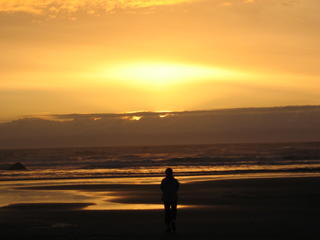
From Ruby Beach we drive down the coast to Olympia, gazing in silent wonder as the moon, almost full, drifts between the clouds. The car stereo plays Ghalib. We talk of moonlight and Urdu and all things silver.
Once in Olympia, we stop at a nice little cafe for dinner. The best thing about this restaurant is the coffee - where else can you find a place whose menu includes a double shot of espresso added to a mugfull of regular fresh brewed coffee. That's coffee the way it's supposed to be!
Day 3
The next day, we start early again, but can't resist the temptation to drop into the IHOP next to our hotel (the first we've seen the whole trip - talk about fate). One large stack of chocolate chip pancakes later, we're on our way to the Mt. St Helens National Monument. The road to the volcano leads through the Gifford Pinchot forest, a beautiful woodland of thick, lush trees, giving way (as we climb higher) to tall stands of conifers towering above the road. This is a more or less deserted road (at least at this time of the day / year) - we cross no more than one or two other cars. The way is misty now, low-hanging clouds cover the highway, so that visibility is poor and we have the illlusion of floating through the forest like ghosts. We have little hope of being able to see the mountain itself - visibility seems too poor for that, but the drive is so pleasant that we go on anyway.
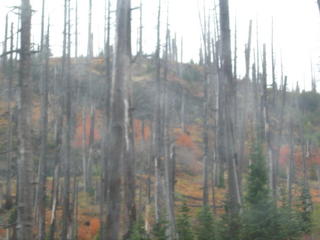
As we come nearer to the volcano, the landscape changes drastically. We are now in the country that was devastated by the 1980 explosion of Mt. St. Helens. Here there are no tall trees, but rather a dense undergrowth of shrubs in a range of wondrous colours (reds, oranges, maroons, yellows) dotted with blackened stumps of burnt out trees. The effect is achingly desolate. This is a true wasteland, a burnt-out land that speaks eloquently of the terrible beauty of destruction, a landscape of loss. Eliot writes:
"What are the roots that clutch, what branches grow
Out of this stony rubbish? Son of man,
You cannot say, or guess, for you know only
A heap of broken images, where the sun beats,
And the dead tree gives no shelter, the cricket no relief,
And the dry stone no sound of water. Only
There is shadow under this red rock"
This effect of desolation is made sharper by the whiffs of cloud drifting about us, like spec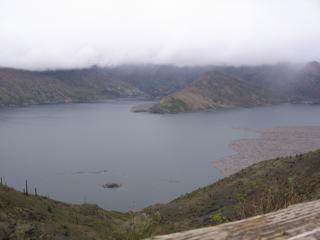 tres crying out against the destruction of the ancient forests. As we drive through, we have the sense of violating some sort of consecrated ground, as if we had accidentally wandered into some sort of ancient burial ground. This feeling is made worse when we come across Spirit Lake, an eerily still expanse of water, like a great silenced tear, its edges lined with the rubbish of dead trees.
tres crying out against the destruction of the ancient forests. As we drive through, we have the sense of violating some sort of consecrated ground, as if we had accidentally wandered into some sort of ancient burial ground. This feeling is made worse when we come across Spirit Lake, an eerily still expanse of water, like a great silenced tear, its edges lined with the rubbish of dead trees.
Finally, we arrive at Windy Ridge, the main viewpoint for Mt. St. Helens. As we had expected (but never quite admitted to ourselves) the cloud cover is too thick for us to see much, though by straining both our eyes and our imagination we can just about make out the shape of the volcano. Just as we are considering going back, though, a stranger points to a tiny little stairway that leads up to the top of a nearby hill. Enthusiastically we set out to climb. Ten minutes later we're regretting it. The path is dizzily steep here - the steps go up and up, so that you climb a thousand feet in what is probably less than half a mile. By the time we get to the top we are winded, gasping for air. This is a burnt out-hill, its surface the colour of ash. We walk along to the main viewpoint at the summit, and the view is stunning - a vista of total devastation. We stay up there a while then make our clumsy breathless way down, trying not to look beyond the next step or two for fear of vertigo.
From Windy Ridge, we head North to Mount Ranier National Park. Again we are treated to long avenues of majestic trees. As we enter the park, we come across a doe and her fawn standing in the road. We stop, take pictures, being disgustingly touristy and enjoying ourselves thoroughly. By the time we get through lunch at the Park lodge, it is starting to rain. M is happy because she finally gets to use her raincoat. We take a trail to the Grove of the Patriarchs, our feet squelching through mud and fallen foliage. Another walk through the forest by a stream, only here the forest is taller and the light drips down on us from a great height, like raindrops of a benediction. We end up in a grove of imposing and ancient trees, an apt setting for druidic ritual and the dance of satyrs. Once again we are reminded of our own insignificance, the ephemeral nature of our existence when it is compared to these stern, silent elders. We drive up through the park, stopping at a succession of waterfalls, taking in views of Reflection Lake. These are pleasant sights, but there is something missing - the thick fog all around us means that we cannot see into the distance, and we are conscious of missing the grand views that are the park's chief attractions.
Then, just as we are leaving the park, we see it! A sudden clearing in the road, a small window of clear sky among the clouds, and there it is - Mount Ranier - towering over the surrounding landscape in all its awe-inspiring majesty. M slams on the brakes and we jump out and stand by the side of the road, drinking in the view. There is the sense of some great truth revealed, of some mystical secret finally apprehended. We leave the park happy, satisfied at having seen what we had come all this way to see. It shall take us a while to get back to our hotel in Seattle. There will be wrong turns, a convuluted excursion through the bowels of the airports rental car return system, the painful details of clearing out and vacuuming the rental car, but we shall be sustained through them by the knowledge of another successful vacation, another pleasant weekend getaway.
Day 4
M's flight leaves at 7 in the morning today, so we are up way before dawn. I travel to the airport with her, see her off on her flight, then find the nearest Barista and sink gratefully into a Venti Cappucino and an apple crumble. My own flight is to Phoenix via Reno and then on to Philadelphia - this means that I pretty much spend the whole day travelling. I nerve myself for the ordeal.
The flight from Seattle to Reno turns out to be a revelation though. It's a clear day and from the great height of the airplane I can see for miles. As we skirt the Western coast of the United States, I not only take in breathtaking views of the two mountains the clouds had hidden from me the day before (Mt. St. Helens and Mt. Ranier - ironic, isn't it, we drove the whole day to see them and barely got a proper view, and then half an hour into a flight I fully intended to sleep through, there they were) but also of Crater Lake and a whole bunch of other snow-capped peaks whose names I have no way of knowing. It was a wondrous flight, made all the more thrilling by the fact of the sights being entirely unexpected.
The rest of the flight home seemed even more boring by contrast. Lunch at a Mexican restaurant in Phoenix airport fortified me a bit, and reading Plutarch on the flight kept me awake through most of it, but it was a dull and uneventful experience nonetheless. It's strange, though, how the momentum of a good vacation keeps on going. Waking up this morning and heading out to office, I couldn't shake the feeling of walking through an alien city, one in which I am a stranger. I felt as if I must observe the city more carefully, weighing and judging it, even though it's been over a year now since I started living here. Even as I write this, it's hard to believe that I'm going to go back to my own room tonight, that the end of this day won't be a new arrival, another hotel room discovered, another city occupied and crossed off the map of places I've never been. There is a sense of relief in this thought, but there is also disappointment. I have come home, it is true, but there is a part of me that is still out there, in the Washington wilderness, wondering what the weather will be like tonight; whether the moon will be full and whether the stars will shine brightly over the Cascade mountains. The sights I saw, the places I visited, were not unique or spectacular enough for me to claim that the memory of them will haunt me. But they were rich with a sense of nostalgia, with the sense of world rediscovered, of a time returned to, which means that there is some part of me that will continue to haunt them for as long as I live.






 Coming down from the Champlain Islands, we stop at Burlington for lunch. With the nose of a true-bred bloodhound we make our way to an intersection that boasts cuisine from all across the world - Indian, Caribbean, Mexican, Japanese, Chinese, Thai - there's even an Irish pub! We pick Thai.
Coming down from the Champlain Islands, we stop at Burlington for lunch. With the nose of a true-bred bloodhound we make our way to an intersection that boasts cuisine from all across the world - Indian, Caribbean, Mexican, Japanese, Chinese, Thai - there's even an Irish pub! We pick Thai. 




















